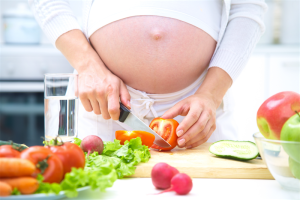 Eating right during pregnancy is one of the best things you can do for yourself and your baby. The amount of weight gained during pregnancy can affect the immediate and future health of a woman and her infant.
Eating right during pregnancy is one of the best things you can do for yourself and your baby. The amount of weight gained during pregnancy can affect the immediate and future health of a woman and her infant.
Excessive weight gain puts patients at risk for gestational diabetes, hypertension, preeclampsia, difficult deliveries and cesarean delivery in addition to having more difficulty losing weight postpartum. Not gaining enough weight in pregnancy can lead to growth restricted babies or preterm birth. Pregnant woman need to eat approximately 300 extra calories per day.
Recommendations for weight gain for a singleton pregnancy are based on pre-pregnancy BMI which can calculated from your height and weight online or with an app. The recommendations are as follows:
Iron is especially important during pregnancy to help prevent anemia. Iron rich foods include lean red meat, iron-fortified cereals, beans, green leafy vegetables like spinach or kale and some dried fruits like prunes, despite eating a diet rich in iron supplement. We will check for anemia around 24-28 weeks and let you know if a supplement is necessary in addition to your prenatal vitamin.
Many of the foods that you are advised to avoid during pregnancy are because they put you at risk of Listeria, a bacteria that can cause miscarriage, severe illness in the newborn, or fetal death. In general you should avoid raw or uncooked meats because of the risks of all bacteria, not only listeria, but also toxoplasmosis, salmonella, E. coli, etc.
During pregnancy, you will need to eat about 300 more calories a day than before you were pregnant. This is the equivalent of a sandwich and a glass of milk. Eating healthy snacks is a good way to get in added nutrition and calories. Many women feel better eating regular snacks and smaller meals.
Each day you should eat sources of protein, carbohydrates, vitamins, fats and minerals.
Protein is the main “building block” for cells. Protein helps produce extra blood you will need along with added stores of energy. Meat, beans and eggs are good sources of protein.
Carbohydrates provide energy. Bread, cereal, rice, potatoes and pasta are common sources of carbohydrates.
Calcium helps build strong bones and teeth. The best sources of calcium are milk, cheese, yogurt, sardines and spinach. The recommended daily allowance is 1200 milligrams of calcium, about four 8-ounce glasses of milk.
Iron helps to create red blood cells, which deliver oxygen to your baby. Iron also will help to prevent fatigue. Lean red meat, spinach, whole grain breads and fortified cereals are all good sources of iron.
Vitamin C promotes healthy gums, teeth, and bones along with helping your body to absorb iron.
| Daily Food Choices | ||
| Food Group | Servings Per Day | Examples |
| Bread, Cereal, Rice, Pasta | 9 | 1 slice bread, 1 oz. cold cereal, 1/2 cup cooked |
| Vegetables | 4 | 1 cup salad greens, 1/2 cup cooked veg., 1 cup raw veg., 3/4 cup veg. juice |
| Fruit | 3 | 1 medium apple, banana or orange, 1/4 cup raisins, 4 oz. orange juice |
| Poultry, Fish, Dry Beans, Meat, Eggs and Nuts | 3 | 2-3 oz. cooked lean poultry, fish or meat, 1 oz. meat= 1/2 cup dry beans, 1 egg, 1 oz. low fat cheese, 2 T peanut butter |
| Milk, Yogurt and Cheese | 3 | 1 cup milk or yogurt; or 1 and 1/2 oz. low fat cheese |